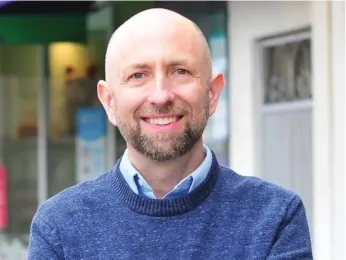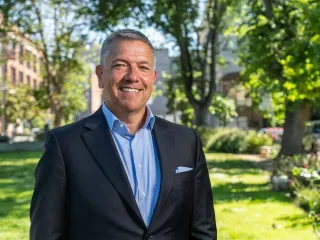
Aug 27
Editorial: Sunset voters should reject Engardio recall
BAR Editorial Board READ TIME: 4 MIN.
Recalls of elected leaders used to be rare, but that has changed in the last three years, with citizen-led efforts in San Francisco and Oakland seeing officials toppled at the ballot box well ahead of their terms ending. On September 16, residents in San Francisco’s District 4 will weigh in on whether to boot gay Supervisor Joel Engardio from office. They should reject the recall and vote no on Proposition A.
Recall proponents started their effort shortly after last November’s general election when Proposition K passed citywide. That measure permanently closed a portion of the Upper Great Highway to vehicle traffic and turned it into a park, now known as Sunset Dunes. While voters across the city supported Prop K, those residing in Engardio’s D4 strongly opposed it, by 64%. Engardio said during his 2022 campaign for supervisor that he supported a compromise that would leave the Great Highway open to cars on weekdays.
But then he changed his position. As a supervisor, Engardio supported Prop K, and, with four of his colleagues, got it on the ballot. It was at this point that Engardio, to his detriment, vastly underestimated just how angry many of his constituents were about the possibility of their main thoroughfare being closed to cars and their fears of increased traffic on side streets negatively impacting their quality of life. All of the other positive things Engardio had done during his time on the board, such as initiating the popular Sunset night market, quickly went out the window as his constituents focused on the Great Highway issue. That anger turned into action after the election.
Asked about his 2022 statements by the Bay Area Reporter earlier this year, Engardio pointed to his campaign website that year, which stated he supported the possibility of a park between Lincoln Avenue and Sloat Boulevard. He also said that he "supported the compromise in 2022 because that was the best we had in the moment."
It’s interesting to note that major traffic fears in D4 have largely not materialized. City transportation officials released a report in July that showed that while some routes, such as Chain of Lakes Drive, a main route to cut through Golden Gate Park, saw an increase in congestion, another key route, the still open section of Upper Great Highway between Fulton Street and Lincoln Way, saw a decrease in traffic, as the San Francisco Chronicle reported.
But by the time that report was issued, the recall was already on the ballot. Just after the November election, with talk of a recall escalating, Engardio pledged to work with the San Francisco Municipal Transportation Agency to mitigate traffic issues. He has done that this year.
Engardio has wanted to be a city supervisor for years. He had run for supervisor three times (in District 7) before being redistricted into D4 and ousting incumbent supervisor Gordon Mar in 2022. It was the first time a sitting supervisor had been defeated since district elections were re-introduced in 2000. But Engardio, though a moderate, was not a city power player.
While he received support from some Democratic clubs and elected officials, he was more of an outsider in the City Hall political scene. That has shown up in the recall fight – Engardio has not won the bushel of endorsements that one might expect. The more moderate Alice B. Toklas LGBTQ Democratic Club has opposed the recall (Engardio formerly served on its board). The progressive Harvey Milk LGBTQ Democratic Club voted not to take a position. The San Francisco Democratic Party was expected to hold an endorsement vote August 27 (after we had gone to press), a mere two and a half weeks before the special election. It’s unknown whether Engardio supporters on the party’s central committee will be able to muster the necessary votes for a No on Prop A endorsement.
As an out elected official, Engardio has brought LGBTQ visibility to the Sunset, and that’s a positive thing, in our opinion. For too long, the neighborhoods west of Twin Peaks were viewed as more conservative. That has changed in recent years, with more out community leaders residing there. Engardio’s surprise victory showed that voters were willing to give him a chance, and, in the process, open up the Sunset to diverse voices. Engardio has proudly marched in community parades, including San Francisco Pride and Chinese New Year, with his husband.
Recalls should be reserved for elected officials who’ve demonstrated negligence in office, or been convicted in a criminal case. We supported the recall of three San Francisco school board commissioners in 2022 because they were incompetent and put their interests ahead of students, parents, and staff. Conversely, we did not support the recall of former district attorney Chesa Boudin that same year because he was largely acting on what he said he’d do during his campaign, though we didn’t agree with him on everything.
Which brings us to Engardio. He has not committed malfeasance while in office. He rightly points out that if residents are dissatisfied with his job performance, they can vote for someone else next year, when he would be up for reelection. As it stands now, if Engardio is recalled, Mayor Daniel Lurie would appoint a successor, presumably someone moderate like Engardio, who would then face voters at the next election, likely next June.
Engardio has an uphill climb to hold onto his seat. However, if D4 voters judge Engardio on his overall job performance, there is little reason to recall him. Unfortunately, many Sunset voters appear aggrieved and fixated on the Great Highway issue. And almost nothing motivates voters more than anger.
That being said, and with a couple of weeks before voters must turn in their ballots, we urge D4 voters to vote no on Prop A.



